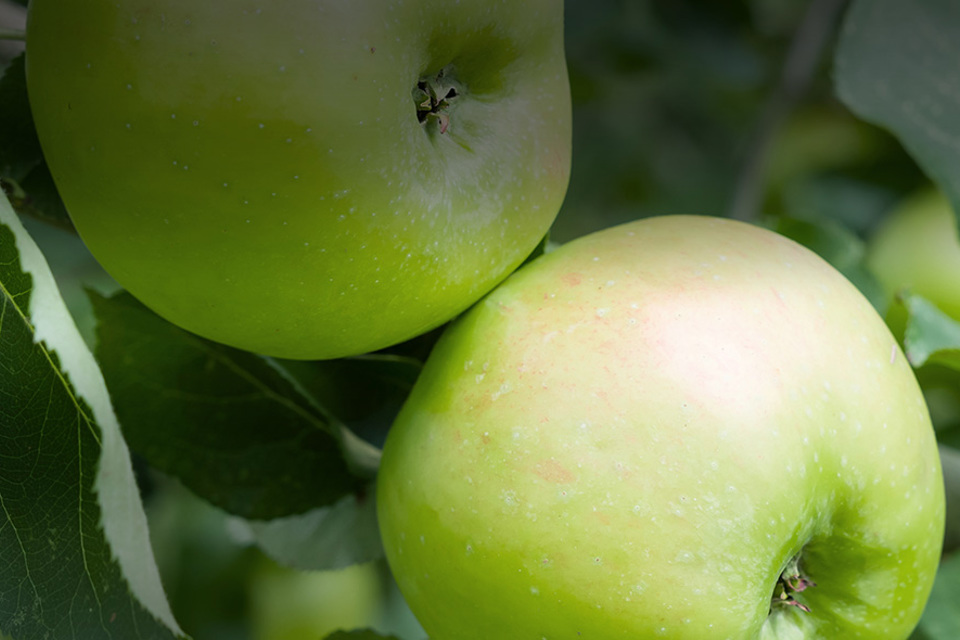
Celebrating the vintage, embracing the future
Case Study - 19.07.23
Somerset farmer William Thatcher made the first ever Thatchers cider at Myrtle Farm in 1904.
Today, the farm continues to honour traditional varieties, as well as leading the way in cider innovation with its extensive variety trials.
As was the tradition in the early 1900s, Myrtle Farm – a mixed enterprise at the time – grew cider apple trees and pressed the fruit to make cider for its farm workers.
William Thatcher soon became known for making the best cider around and began selling it in the local villages. The tradition continued through the generations to current cider-maker Martin Thatcher, William’s great grandson. The fifth generation is also now working for the business, which has its roots firmly in the Mendip Hills area of north Somerset.
Having been a mixed enterprise until 20 years ago, the farm now grows apples solely for cider production, with more than 500 varieties planted. They focus on a core range of 26 for commercial cider making, ranging from varieties with high tannin content, for ciders that require a complex depth to the flavour – such as Thatchers Vintage – to low tannin eating and juicing varieties for the increasingly popular lighter style ciders – such as Thatchers Katy.
Farm manager Chris – who grew up on a farm and previously worked at Frontier and Heineken – is particularly partial to Thatchers Rascal, crafted from bittersweet apples, but added: “My fridge is full of Thatchers Gold – you can’t beat it for a well-balanced cider which just hits the spot. Equally if I’m driving, a bottle of Zero – our alcohol-free cider – is just as good."
As an homage to its early beginnings, the farm also has an exhibition orchard of 458 rare and heritage apple varieties curated by third generation cider maker John Thatcher. Many of the varieties came from the National Fruit and Cider Institute at Long Ashton when it closed.
“We believe this to be the largest collection of apples for cider in the country and is an incredibly important living library,” Chris commented.
As well as honouring the traditional, they are currently trialling 100 varieties, exploring the cider apples of the future to keep up with consumer tastes.
Like many farms, Myrtle has also diversified its business, offering farm tours and running the popular Railway Inn which includes a restaurant and bar selling an array of ciders. The pub is located along a walking/cycle path close to the farm, The Strawberry Line. The farm also works closely with local schools to teach children about the life cycle of apple trees.
A year on the farm
With cider apples being a lower value crop compared to dessert apples, input and establishment costs must be lower too. But being a juice producer, the farm doesn’t have the same concerns about size, colour, shape and storage which keeps some costs down, including labour due to the mechanisation. Nevertheless, they are not immune to the price increases being felt across the farming sector, said Chris.
Having fewer concerns about superficial damage to the fruit also means the farm’s primary tasks throughout the year differ slightly from those growing eating apples. Trees are dormant from December to March and blossom time occurs in April/May depending on the variety – traditional cider varieties are later than others.
“Our trees are grown on semi-vigorous rootstocks such asMM106, MM111 and M116; after a few years they should be self-supporting,” Chris explained. “Harvest is amechanised process which involves letting some apples fall naturally, shaking the remainder off trees and collecting the apples from the floor before being transported in bulk to the mill where they are pressed.
“All our apples are pressed at Myrtle Farm, and our ciders made right here. All our packaging is also carried out here – canning, bottling and kegging. In that way we are able to ensure quality every step of the way.
“It’s important for us to press the apples immediately after harvest (within 24 hours) so that we have the freshest flavours in our juice. In order for us to make cider all year round, we store the juice in temperature-controlled vats so that it is always in optimum condition.”
He added: “The orchard year starts in winter when we prune/shape the trees – we keep our trees in what we call hedgerow style, so that we harvest maximum sunlight. Each year we plant new trees across our Somerset orchards, and the spring is spent ensuring the trees are in top condition.” Harvesting at the optimal ripeness is particularly important for cider making: “This is usually when all the starch within the apples has been converted into sugars.
For early varieties this window is very short, only a few days, so we need a quick and efficient harvesting process.” This begins at the end of August with varieties such as Katy and Grenadier and ends with Dabinett and Vilberie towards the end of November. “It’s important for us to have a range of apple varieties that crop throughout the harvest period.”
The farm works with local beekeepers who keep hives in the orchards all year round, but they don’t just encourage honeybees. “Solitary bees and bumblebees play their part too – so we have an active management system for the orchard margins and hedgerows, and plant wildflower plots where we can, to encourage wild populations of solitary bees,” he said.
Sustainability is integral
Being a family company and growing apples and producing ciders in a sustainable way, is integral to the farm. Whether that be reducing plastic packaging (an area they are continually researching and innovating), or installing solar panels to contribute to their use of renewables and energy creation across their cider making.
“We work hard to constantly reduce our use of water, to reduce our carbon, and our waste throughout our cider making process,” Chris commented. “And we’re doing all of this from the ground up. We’re not investing in offset schemes or anything like that – we want our progress to be meaningful, genuine, and in itself, sustainable.
“As a cider maker with hundreds of acres of orchard, planting trees is second nature to us. As a family, Thatchers has been planting trees for generations. The resulting biodiversity within our orchards is amazing, and this is something that benefits not just our apples, but our local community too."
There are 3,000 solar panels at Myrtle Farm which they anticipate will provide a total CO2 saving of 301 tonnes a year, and an annual generation of1,064Mwh of electric, contributing to the green energy that is produced and used across the farm all year round. A biomass boiler also uses wood chippings from the orchard, and apple waste left over from the cider making process goes for anaerobic digestion, though some is saved for cattle feed.
Around 18 months ago, they also acquired a nearby 50-acre block of land which is the subject of a regenerative project. Having been arable land for at least 50 years, soil testing confirmed that the organic matter levels had fallen to the minimum, so a soil regeneration project is underway before any apple trees are planted. It will be in herbal ley with grazing sheep for 3-4 years.
As the saying goes, “a farmer is only as good as their soil” so Myrtle carries out soil testing across the farm every two years and takes an in-depth scientific view of getting the chemistry right in the soil – whether that’s trying to balance out nutrients that are too high, causing locking up, or looking at organic matter levels.
Around 18 months ago, they also acquired a nearby 50-acre block of land which is the subject of a regenerative project. Having been arable land for at least 50 years, soil testing confirmed that the organic matter levels had fallen to the minimum, so a soil regeneration project is underway before any apple trees are planted. It will be in herbal ley with grazing sheep for 3-4 years.
As the saying goes, “a farmer is only as good as their soil” so Myrtle carries out soil testing across the farm every two years and takes an in-depth scientific view of getting the chemistry right in the soil – whether that’s trying to balance out nutrients that are too high, causing locking up, or looking at organic matter levels.
A mechanised process
With cider apple harvesting being a mechanised process and the farm team keeping busy all year round, Myrtle has only seven permanent staff and no need for seasonal pickers – a fact which surprises many people, Chris said. Within the Thatchers business as a whole, however, there are around 250 staff, and the farm will take on two apprentices as part of the Thatcher’s Early Careers Programme.
Much of the machinery the farm has, for example its harvesting equipment, is bespoke to the cider apple industry and comprises brands such as SFM, Baven hills and Tuthill. “We typically have larger tractors than traditional fruit farms as our trees are planted on wider rows; this means they can be utilised for other jobs such as hauling apples into the mill from the orchards. When purchasing equipment, we are constantly looking to improve efficiency, such as reducing passes, fuel economy, reliability. There is also an emphasis on driver comfort.”
There remains a “hangover” from the shortages of machinery and parts triggered during the pandemic. The farm managed to buy an apple harvester just in time, but it now keeps more parts in stock as availability and lead times continue to pose some problems
Loss of Chemistry is a concern
Another benefit of being juice producers is that many of the superficial pests other growers would be concerned about are not a problem for Myrtle Farm.
Instead they focus on those that harm yields and tree health, including apple blossom weevil, rosy apple aphid, apple sawfly, woolly aphid and mites –specifically spider mites.
On the disease side, being in the west of the country scab is one of the primary diseases of concern. Mildew can come in certain weather conditions and canker in some varieties. Fire blight is seen intermittently.
Myrtle Farm has worked with Agrii for at least 18 years, going back before Chris and agronomist Matt Greep’s time. Loss of chemistry to deal with pests is one of the biggest concerns, Matt explained. “We’ve known that for some time and Chris is very good at putting things in place to mitigate it – for example reduced nitrogen inputs to make Katy less susceptible to woolly aphid and thinking about how they prune because the aphids like to overwinter in the crevices around the pruning cuts.”
“There are some really good cultural controls that Thatchers have put in place to try to minimise the risks. Chris has also tried some alternative products with varying degrees of success, including Sion and Magnesium Sulphate forbreaking down the woolliness on the pest.”
Insecticides with a physical mode of action have been quite successful and the farm uses more bio-stimulants each year, Chris said. “These are trying to kick start the immune system in the trees and I think there’s quite a bit of potential there in terms of what can be available. Quantifying it can be tricky but it’s something that we’re keen to pursue.”
Matt also praised Chris and the team on their successful use of the Batavia product, as it’s something the industry has struggled with. “Batavia is aspirotetramet, which is a very good ingredient for sucking pests. But it’s a very technical product – it must go on at the right time, and it can’t be tank mixed so it’s a single pass on its own. If the tissue is too warm, the stomata close up and it won’t go in. It’s a systemic product only so there’s no contact activity.
“As an agronomist, when I advise that product a lot of growers try and take short cuts and then it doesn’t work, but the Thatchers team are very good at thinking about how they can get the best out of the products. So although we’ve seen certain areas of the farm that probably haven’t had the best results from the product – perhaps because the pest pressure was just too high for it to manage – in other areas we’ve certainly seen it work well. And I put that down to the guys being very good at what they do when it comes to application and knowing how to use these products.”
Encouraging beneficials
There’s a big emphasis on letting beneficial insects fight it out with pests where possible. “The main thing we do, and a lot of people do, is avoiding broad spectrum insecticides – the loss of products is easy to fall back on with some of these but we’re trying to hold our own on that and maintain those natural background populations, ”Chris said.
As well as avoiding products that affect those beneficial populations, they try to encourage habitats – whether it’s in non-cropped areas around the orchards, or more recently, trying mixed species sward mixes between the trees in their young orchards over the past couple of years.
When having conversations about what products work well for certain pests, Matt and Chris will not only consider whether the product hurts the pest, but also whether it hurts the beneficials. Matt explained: “We need to factor that into the equation as well and that’s really integral for the IPM structure of the farm to work successfully.
It’s a key part of the decision making – what is the product’s beneficial profile like, and do we have any data to back that up? If we haven’t, where are we going to find it?”
Weather Considerations
Although the farm has a couple of low-lying areas and some early flowering varieties, frost is not usually much of a problem. The only mitigation strategy is growing a range of varieties in different areas. The farm is quite protected and traditionally a lot of its branches are late flowering so they tend to miss any frost events.
Although the farm has a couple of low-lying areas and some early flowering varieties, frost is not usually much of a problem. The only mitigation strategy is growing a range of varieties in different areas. The farm is quite protected and traditionally a lot of its branches are late flowering so they tend to miss any frost events.
There are a couple of products available with limited trial data on frost protection, but the margins are very fine, providing 0.5–1ºC protection, Matt said. Although farms often fear frost events, the greater real-world threat is protracted cold springs that can lead to poor flowering and pollinating conditions.
“That’s where we’ve got armoury that could mitigate against that and the biostimulant range would certainly help. ProAct is a harpin protein that helps the plant defend itself by sending signals into the plant, helping calcium bind to the internal parts of the cell tissues. By having a higher concentration of calcium, it takes colder temperatures for cell decay to occur and it promotes normal activity – whereas plants that are under stress tend to shut down normal activity and go into protection mode."
Being based in Somerset, they often experience long periods of wet weather in winter, which along with the heavy land can lead to root death – so rootstocks must be tolerant of wet feet. At the other end of the spectrum, the farm fared well during the very hot summer of 2022 and its growers were not overly affected either, Chris said.
Having planted the trees early and got them into good condition before the high temperatures hit, they didn’t need to water them – although they have done in previous years. In fact, they processed their largest ever crop, totalling 30,000 tonnes. If anything, higher rates of sunshine resulted in higher sugars which is a positive from a cider making point of view, Chris added.
Nevertheless, rising temperatures are something they must keep an eye on.“With a lower value processing crop, at what point can we justify investing inirrigation? If we get more summers where we think it’s justifiable maybe ourthinking will change.”
Ciders of the future
Looking to the future of the cider apple industry, Chris said there is potential for further automation – “whether it be during the harvesting process or even pruning – the majority of which is still done manually”. He added: “It is encouraging to see the developments in other areas of agriculture and horticulture that our industry can look to.”
For Thatchers, the aim is to keep doing what they’re doing – “making the best cider around, innovating and keeping our consumers excited about new flavours and styles.”
As part of this the farm is running more tree trials that anyone else in the industry, according to Chris – featuring around 100 varieties making up 10% of the total acreage. Key to this is finding varieties that are good for the market, but also grow well in Myrtle’s system.
“Some things that are perfect for the market are not that easy to grow so there’s a trade-off. Some varieties don’t like growing in our system and we can’t get the yield high enough despite making a very good cider. Equally I’ve got varieties which are fantastic cropping, easy to manage, low pest and disease pressure and just a joy, but if they don’t make good cider there’s no point growing them. Certain varieties tick both boxes and that’s what we’re always looking for.”
Thatchers’ trials include lots of eating varieties with low tannin content, which the cider market is increasingly moving towards as it makes for a lighter, more refreshing cider. This could be the way to encourage new drinkers into the market, Chris said. The trials are helping to identify the best eating varieties for cider making.
Many traditional or vintage varieties were also brought into the trials programme a few years ago. “Lots of those varieties have a really good reputation but have not been grown in a modern way so we’re seeing how they perform in those systems. We’ve also brought over a few French varieties to see how they do in Somerset. There’s lots of interesting things going on.
“It’s a constantly moving market so we’re always looking at trends,” Chris added. “Fundamentally the cider and the whole alcoholic drinks market is reducing in size. We’ve been bucking that trend which is nice but it’s obviously a concern when the overall market is shrinking.”
As generation Z increasing moves towards no alcohol or low alcohol, Thatchers Zero took two years to get right but after lots of trials Chris said they have a good strong product that is gaining good traction with consumers.
One of the challenges is persuading the consumer that it’s not just a sparkling apple juice and the fermentation process requires the same level of care as with any alcoholic cider – and therefore it commands a similar price. “But we’re getting there,” said Chris.
With fruit ciders being a big part of the market in recent years, Thatchers has launched a couple of its own and these will always be part of the cider industry going forward, Chris reckons.
The biggest cider launch we’ve done was last year and that was called Blood Orange. That was actually off the back of noticing trends in the spirits market and blood orange flavours seemed to be really taking off there. It’s a case of looking at the market and understanding what the market is ready for. We spend a lot of time and effort thinking about the next arena we need to be playing in.”
Incorporating flavours such as blood orange allows for more flexibility in an industry with a very long production cycle, he added.
“We’ve got a very fast-moving industry at one end of the supply chain and a very slow one at the other. We have to take a very long-term view when it comes to growing apples and growing a variety mix which can be adaptable to changing trends.”
Agrii Case Studies: Stories of farmers we’ve worked with
Join Our Community

Agrii X
We love engaging with clients and partners. Give us a follow and let's share stories for the community.

Agrii Instagram
A picture paints a thousand words. Follow us on Instagram to see what we are up to.

Agrii Facebook
Follow us on the worlds biggest social media site for the latest news and events straight to your feed.

Agrii LinkedIn
If you are all about the business, connect with us on LinkedIn to build your network
Stay In Touch

Journal Sign-Up
Receive email updates on topical news and information from around Agrii and UK Farming.

Listen To Our Podcasts
Listen to the Tramlines Podcast. Fortnightly chat about agriculture and trials with your host Tony Smith.

Agrii Insights
Read essential agri intelligence for profitable farming.

Find an Event
Join us for our upcoming events and tours.



